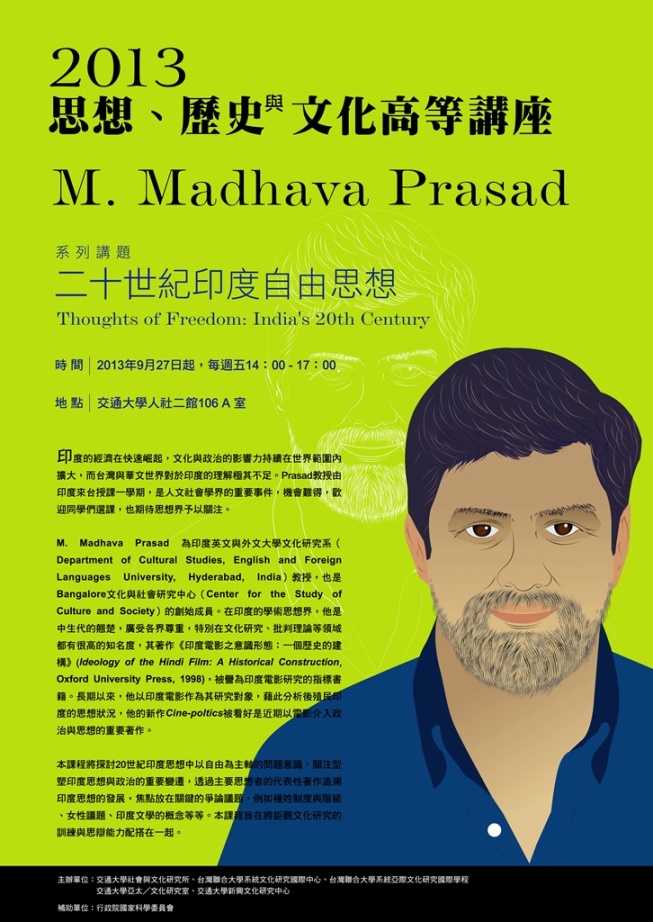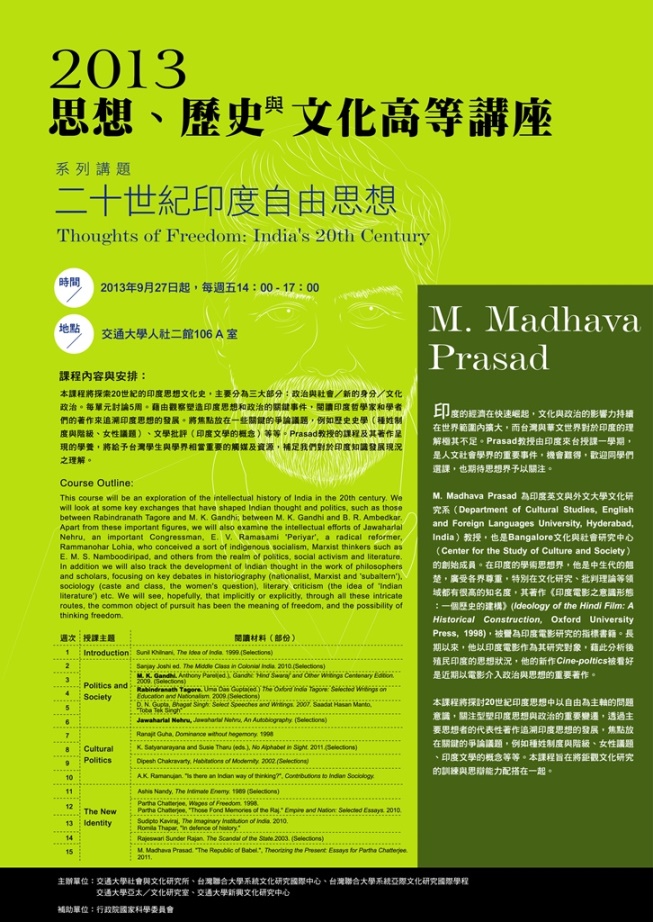2013年思想、歷史與文化高等講座
M. Madhava Prasad
系列講題:二十世紀印度自由思想(Thoughts of Freedom: India’s 20th Century)
時間:2013年9月27日起,每周五14:00~17:00
地點:交通大學人社二館106A室
印度的經濟在快速崛起,文化與政治的影響力持續在世界範圍內擴大,而台灣與華文世界對於印度的理解極其不足。Prasad教授由印度來台授課一學期,是人文社會學界的重要事件,機會難得,歡迎同學們選課,也期待思想界予以關注。
M. Madhava Prasad 為印度英文與外文大學文化研究系(Department of Cultural Studies, English and Foreign Languages University, Hyderabad, India)教授,也是Bangalore文化與社會研究中心(Center for the Study of Culture and Society)的創始成員。在印度的學術思想界,他是中生代的翹楚,廣受各界尊重,特別在文化研究、批判理論等領域都有很高的知名度,其著作《印度電影之意識形態:一個歷史的建構》(Ideology of the Hindi Film: A Historical Construction,被譽為印度電影研究的指標書籍。長期以來,他以印度電影作為其研究對象,藉此分析後殖民印度的思想狀況,他的新作Cine-poltics被看好是近期以電影介入政治與思想重要著作。
本課程將探討20世紀印度思想中以自由為主軸的問題意識,關注型塑印度思想與政治的重要變遷,透過主要思想者的代表性著作追溯印度思想的發展,焦點放在關鍵的爭論議題,例如種姓制度與階級、女性議題、印度文學的概念等等。本課程旨在將鉅觀文化研究的訓練與思辯能力配搭在一起。
課程內容與安排:
本課程將探索20世紀的印度思想文化史,主要分為三大部分:政治與社會/新的身分/文化政治。每單元討論5周。藉由觀察塑造印度思想和政治的關鍵事件,閱讀印度哲學家和學者們的著作來追溯印度思想的發展。將焦點放在一些關鍵的爭論議題,例如歷史史學(種姓制度與階級、女性議題)、文學批評(印度文學的概念)等等。Prasad教授的課程及其著作呈現的學養,將給予台灣學生與學界相當重要的觸媒及資源,補足我們對於印度知識發展現況之理解。
Course Outline:
This course will be an exploration of the intellectual history of India in the 20th century. We will look at some key exchanges that have shaped Indian thought and politics, such as those between Rabindranath Tagore and M. K. Gandhi; between M. K. Gandhi and B. R. Ambedkar. Apart from these important figures, we will also examine the intellectual efforts of Jawaharlal Nehru, an important Congressman, E. V. Ramasami ‘Periyar’, a radical reformer, Rammanohar Lohia, who conceived a sort of indigenous socialism, Marxist thinkers such as E. M. S. Namboodiripad, and others from the realm of politics, social activism and literature. In addition we will also track the development of Indian thought in the work of philosophers and scholars, focusing on key debates in historiography (nationalist, Marxist and ‘subaltern’), sociology (caste and class, the women’s question), literary criticism (the idea of ‘Indian literature’) etc. We will see, hopefully, that implicitly or explicitly, through all these intricate routes, the common object of pursuit has been the meaning of freedom, and the possibility of thinking freedom.
|
週次
|
授課主題
|
閱讀材料(部分)
|
| Week 1 |
Introduction |
Sunil Khilnani, The Idea of India. 1999.(Selections) |
| Week 2 |
Politics and Society |
Sanjay Joshi ed. The Middle Class in Colonial India. 2010.(Selections) |
| Week 3 |
M. K. Gandhi. Anthony Parel(ed.), Gandhi: 'Hind Swaraj' and Other Writings Centenary Edition. 2009. (Selections) |
| Week 4 |
Rabindranath Tagore. Uma Das Gupta(ed.) The Oxford India Tagore: Selected Writings on Education and Nationalism. 2009.(Selections) |
| Week 5 |
D. N. Gupta, Bhagat Singh: Select Speeches and Writings. 2007.
Saadat Hasan Manto, “Toba Tek Singh”
|
| Week 6 |
Jawaharlal Nehru, Jawaharlal Nehru, An Autobiography. (Selections) |
| Week 7 |
Cultural Politics |
Ranajit Guha, Dominance without hegemony. 1998 |
| Week 8 |
K. Satyanarayana and Susie Tharu (eds.), No Alphabet in Sight.2011.(Selections) |
| Week 9 |
Dipesh Chakravarty, Habitations of Modernity. 2002.(Selections) |
| Week 10 |
A.K. Ramanujan. “Is there an Indian way of thinking?”, Contributions to Indian Sociology. |
| Week 11 |
The New Identity |
Ashis Nandy, The Intimate Enemy. 1989 (Selections) |
| Week 12 |
Partha Chatterjee, Wages of Freedom. 1998.
Partha Chatterjee, “Those Fond Memories of the Raj.” Empire and Nation: Selected Essays. 2010.
|
| Week 13 |
Sudipto Kaviraj, The Imaginary Institution of India. 2010.
Romila Thapar, “In defence of history.”
|
| Week 14 |
Rajeswari Sunder Rajan. The Scandal of the State.2003. (Selections) |
|
Week 15
|
M. Madhava Prasad. “The Republic of Babel.”, Theorizing the Present: Essays for Partha Chatterjee. 2011. |
主辦單位:交通大學社會與文化研究所、台灣聯合大學系統文化研究國際中心、台灣聯合大學系統亞際文化研究國際學程、交通大學亞太/文化研究室、交通大學新興文化研究中心
補助單位:行政院國家科學委員會

